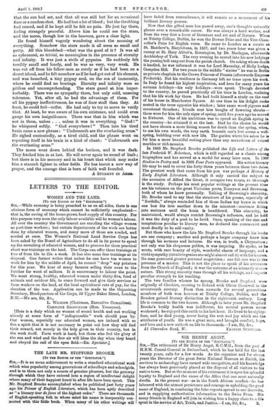THE LATE MR. STOPFORD BROOKE.
[To TIM EDITOR OE TEl "SPECTATOR.,
Bra,—It Is no mean achievement to write a standard educational work .which wins popularity among generations of schoolboys and schoolgirls, and is to them not only a source of genuine pleasure, but the gateway ,through which they have entered into a region of intellectual delight where many of their happiest honri in after life have been spent. This Stopford Brooke accomplished when he published just forty years ago his Primer of English Literature, which has been aptly described as "a literary tour de force of the highest order." There arc thousands of English-speaking folk in whose mind his name is inseparably oon- ,nected with this little book. When many of his other writings wfil have faded from remembrance, it will remain as a monument of his brilliant literary powers.
Now that this gifted man has passed away, one's thoughts naturally' glance over a remarkable career. He was always a hard worker, and from the very first a lover of literature and art and of Nature. Whoa at Trinity College, Dublin, he won the Downo Prize and the Vice-Chan- cellor's Prize for English verse. Ho came to London as a curate at St. Matthew's, Marylebone, in 1857, and two years later VMS given a curaoy at St. Mary Abbot's, Kensington, by Dr. Macla,gan, afterwarde Archbishop of York. The very evening he moved into his now lodgings the passing bell rang out from the pariah church. On asking whose death it knelled, he was informed it was for Lord Macaulay, of Holly Lodge, Campden Hill. For two years in the middle " sixties " he was in Berlin as private chaplain to the Crown Princess of Prussia (afterwards Empress Frederick). But his residence in Germany left no trace upon his work. In Italy he found his highest inspiration, and hero for many years his autumn holidays—his only holidays—were spent. Though devoted to the country, he passed practically all his time in London, realizing that his life work lay there. He had built himself a study on the roof of his house in Manchester Square. At one time to his delight rooks nested in the trees opposite his window ; later came wood-pigeons and occasional thrushes; friends sent him boughs of flowering shrubs— these were for him the only signs of spring, until five years age he moved to Ewhurst. One of his ambitions was to spend an English spring in the country—he attained it at the last. Had he the choice he would not have chosen a more fitting season for death than the spring, when, to use his own words, the very earth beneath one's feet seems a well- spring, bubbling over with new life. The garden where his ashes lio is for him a more beautiful resting-place than any mausoleum of veined marbles or rich mosaics.
In 1885 Mr. Stopford Brooke published the Life and Letters of the Late Frederick W. Robertson, which is still regarded as a classio among biographies and has served as a model for many later ones. In 1907 Studies in Poetry and in 1903 Four Poets appeared. His active literary life may be said to cover the forty-three years between these two dates. The greatest work that came from his pen was perhaps A History of Early English Literature. Although it only carried the subject to the accession of Alfred the Great, it occupies two tomes, so thorough Is the study. Perhaps his most popular writings at the present time are his volumes on the great Victorian poets, Tennyson and Browning, both of whom he knew personally. Talking of Browning's obscurity, Mr. Brooke used to say that the structure of his poems, especially of " Sordello," always reminded him of those Indian toy boxes in which one box fits into another down to the minutest—sentence fitting into sentence until the brain is bewildered. This obscurity, he maintained, would always restrict Browning's influence, and he held It was the duty of a poet to be lucid. Once, speaking of the sins and temptations peculiar to literary men, he declared the commonest and most deadly to be self-vanity.
But those who knew the late Mr. Stopford Brooke through his hooks are one company ; another and perhaps a larger company knew hint through his sermons and lectures. He was, in truth, a Chryseotom; not only was his eloquence golden, it was inspiring. He spoke, as he wrote, with rare beauty of style, wonderful charm of language, and a vivid sympathy (intuitive genius one might almost call it) with his hearers. No man posseased greater personal magnetism ; one felt one WES in the presence of a master. This is not the place to speak of his severe:toe from the Church of England ; it was the outcome of an intensely sinew. nature. This strong sincerity runs through all his writings, an.1
peculiar strength to his teaching.
The two families whence ho sprang, Brooke and Stopford, were originally of Cheshire, crossing to Ireland with Oliver Cromwell in the seventeenth century. From then onwards for several generations members of both won honours at Trinity College, Dublin, and the Brookes gained literary distinction in the eighteenth century. Long
life is common to the two houses. Although ía later years Mr. Stopford Brooke's bodily health was indifferent, his mental powers never
weakened ; he enjoyed this earth to his last hour. He lived to bo eighty. four, and he died young, never losing the zest and joy which are the attributes of youth. He was a great man, and brought comfort, hope, and love and a now outlook on life to thousands.—I am, Sir, &a.,






























 Previous page
Previous page